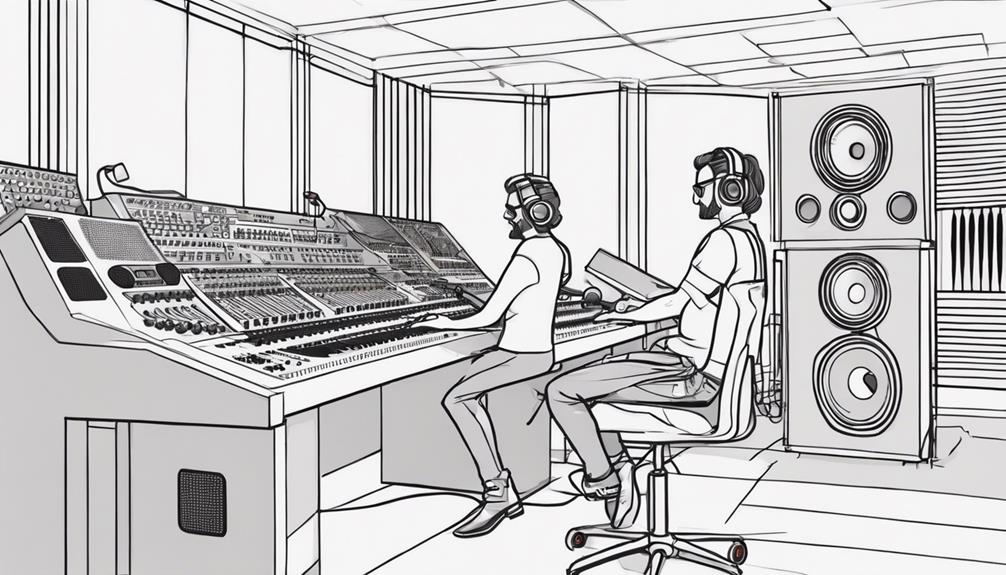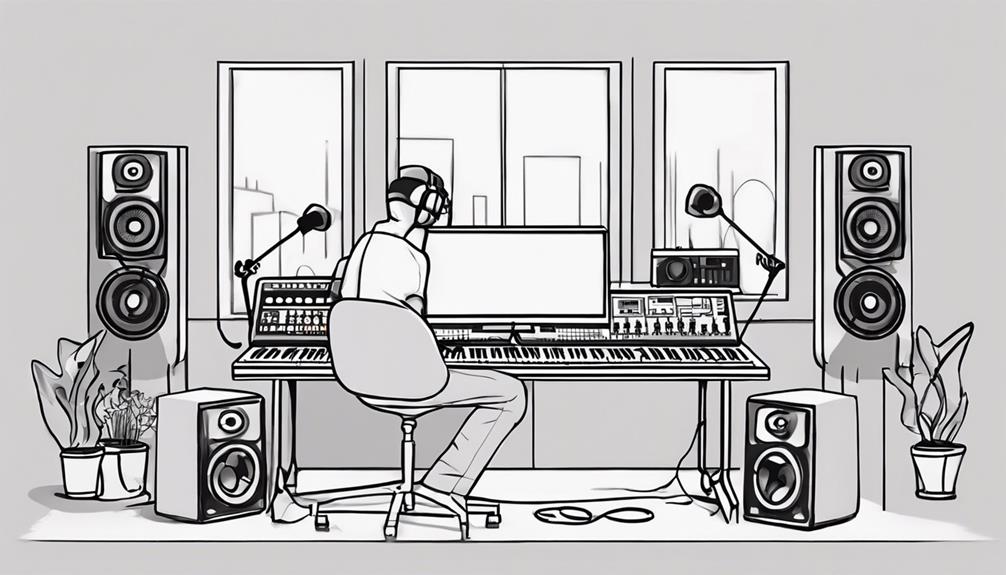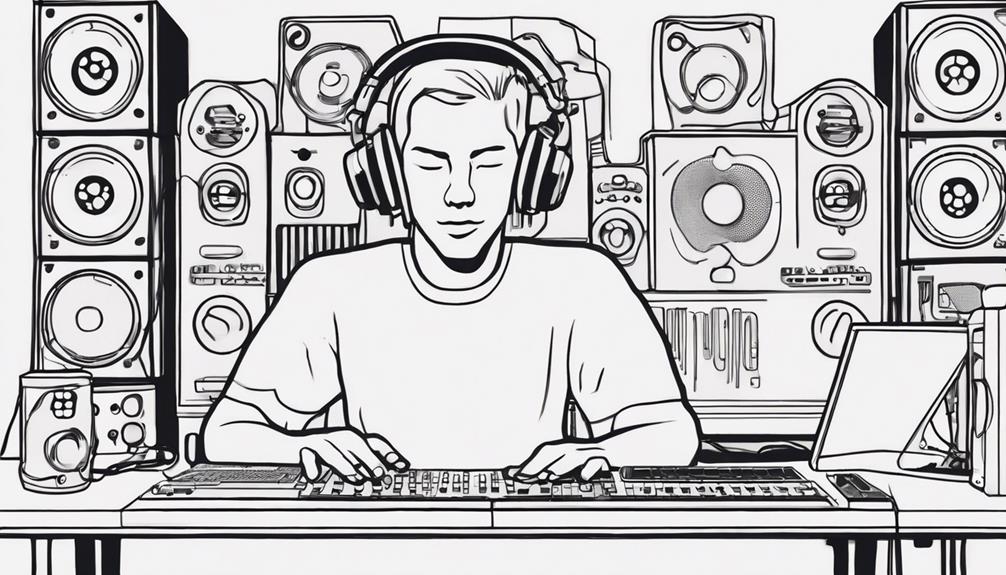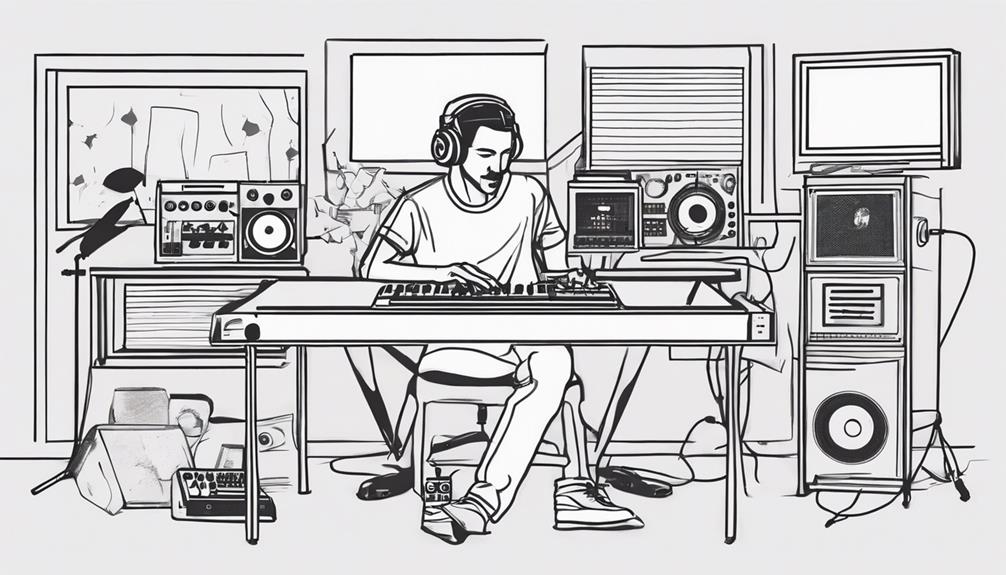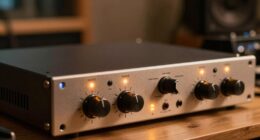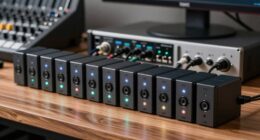Enhance your music production's professionalism by mastering essential techniques: shape your frequency spectrum using EQ, control dynamics with compression, and focus on balance for clarity. Improve sound quality through balancing segments, utilizing compression effectively, and incorporating spatial effects like reverb. Achieve professional results by optimizing audio with precise EQ adjustments, compression, and mastering for clarity and consistency. Craft catchy melodies by keeping them simple and memorable, experimenting with scales, and collaborating with others. Enhance composition skills by creating unique elements, maintaining clear structure, and balancing familiarity with innovation. Get expert tips for taking your music to the next level!
Key Takeaways
- Utilize EQ to shape frequencies and achieve clarity.
- Experiment with compression for dynamic control.
- Focus on balance and stereo imaging for a professional mix.
- Incorporate reverb and delay effects for depth and space.
- Mastering for clarity, balance, and consistency elevates your music.
Essential Music Production Techniques
To excel in music production, master essential techniques like utilizing EQ to shape the frequency spectrum and achieve clarity in your mix. EQ is vital for carving out space for different elements in your track, ensuring each instrument has its place in the mix.
Experiment with compression to control dynamics and enhance the overall sound quality. Compression helps even out the volume levels of different tracks and instruments, giving your music a more polished and professional sound.
Focus on balance and stereo imaging to create a spacious and immersive listening experience. Balancing the levels of each track and paying attention to stereo placement can make your music production sound wider and more engaging.
Incorporate reverb and delay effects to add depth and dimension to your tracks, creating a sense of space and atmosphere.
Master automation techniques to shape track dynamics and create impactful changes in your mix. Automation allows you to control volume, panning, and effects over time, helping you achieve a more dynamic and professional sound in your music production.
Improving Sound Quality With Mixing
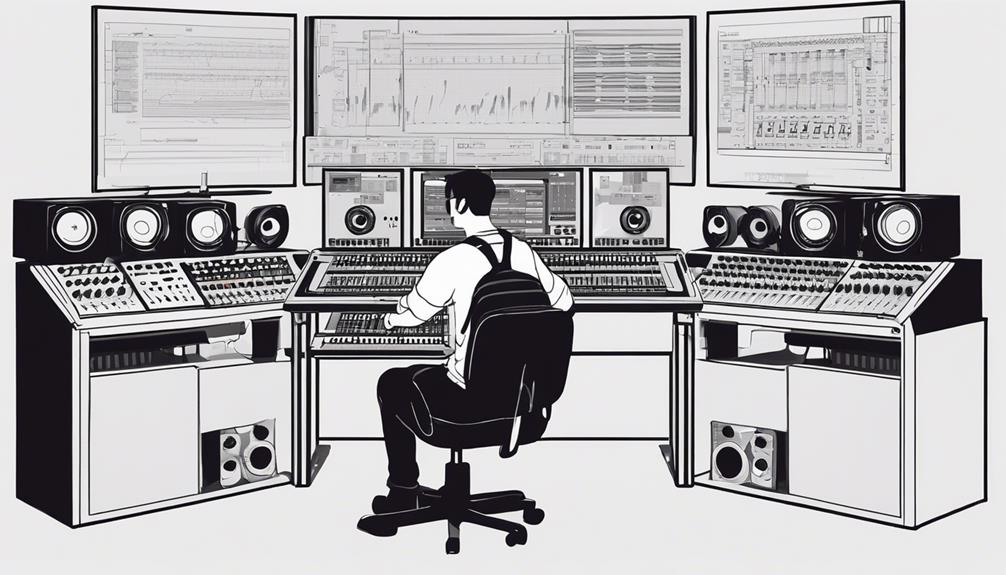
Enhance the overall sound quality of your music production by focusing on improving sound quality with mixing techniques. Enhance the overall sound quality of your music production by focusing on improving sound quality with mixing techniques. Pay close attention to elements like EQ, compression, and panning to create clarity and balance in your tracks. For optimal results, consider using layering and automation, as these techniques can add depth and dynamic movement to your mix. By applying these mixing tips for perfect sound, you’ll elevate your production to a professional level, ensuring every element shines.
Utilize EQ to carve out specific frequencies for each instrument, ensuring clarity in your mix.
Balancing individual segments through mixing is key to creating a cohesive and professional sound.
Pay close attention to dynamic range by using compression effectively to maintain natural dynamics while bringing out the details in your tracks.
In addition, consider incorporating automation into your mix to shape the dynamics of each track and emphasize the ebbs and flows of your song.
Experimenting with spatial effects like reverb and delay can add depth and dimension to your music production, creating a more immersive listening experience for your audience.
Mastering for Professional Results
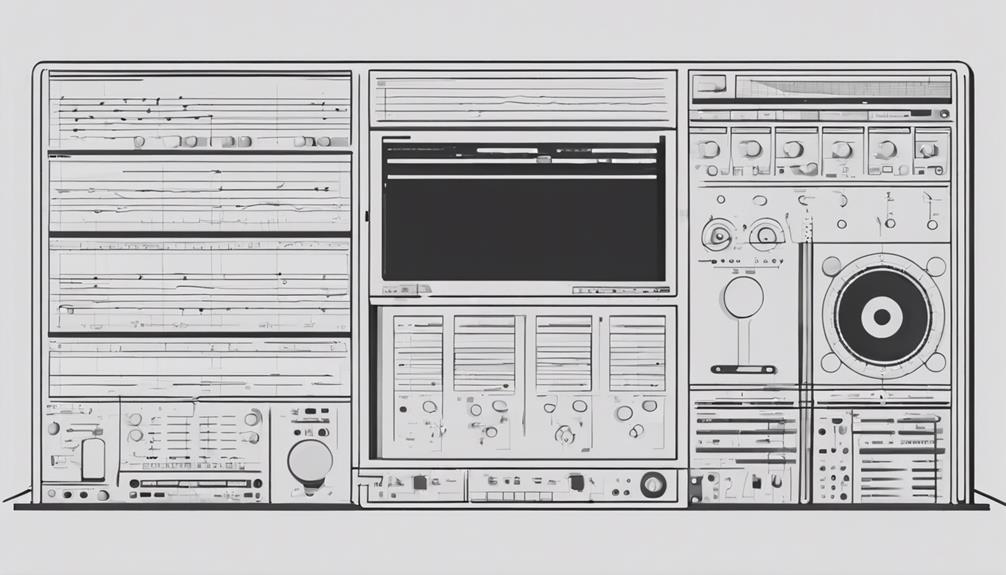
When mastering for professional results, focus on enhancing the overall clarity, balance, and consistency of your tracks.
Mastering is the pivotal final step in music production where tracks are polished to achieve a professional quality. To guarantee your music sounds polished and consistent across various playback systems, mastering involves optimizing the audio through techniques like EQ adjustments and compression.
By making precise EQ adjustments, you can fine-tune the frequency balance of your tracks, while compression helps control dynamics for a more cohesive sound. Additionally, mastering helps in achieving a balanced mix where every element is well-defined and sits harmoniously within the track.
The goal of mastering is to provide a polished sound that's ready for distribution, elevating your music to a professional level. Remember, mastering is about enhancing the overall listening experience and ensuring that your music sounds its best in any environment.
Crafting Catchy Melodies

Craft catchy melodies that resonate with your audience by focusing on simplicity and memorability. Melodies are the heart of a song, so make sure yours are easy to remember and stand out.
Use repetition to reinforce your melody and make it stick in the listener's mind. However, don't forget to add variation to keep it interesting and prevent it from becoming monotonous.
Experiment with different scales, modes, and intervals to introduce unique twists that capture attention. Consider the emotional impact of your melody; it should complement the overall mood of your music.
Collaborating with vocalists or instrumentalists can add depth and melodic richness to your compositions. By crafting memorable melodies with these elements in mind, you can create music that not only catches the ear but also stays in the listener's mind long after the song ends.
Enhancing Composition Skills

To enhance your composition skills, focus on creating distinct and engaging parts that capture your audience's attention. Craft unique musical elements to develop an original sound that stands out. A catchy melody is vital for creating a memorable tune that resonates with listeners. Make sure your lyrics complement the music, enhancing the overall impact of your song.
By maintaining a clear song structure and blending different elements cohesively, you can achieve a professional sound that appeals to a wide audience.
Experiment with various musical techniques to add depth and complexity to your compositions. Incorporate unexpected twists and turns to keep your listeners engaged and interested throughout the song. Remember that simplicity can also be powerful, so don't overcrowd your music with unnecessary elements.
Aim to create a balance between familiarity and innovation, allowing your music to be both memorable and fresh. Developing your composition skills is essential for establishing an original sound and making your music production stand out in the industry.
Frequently Asked Questions
How Do I Make My Music Sound More Professional?
To make your music sound more professional, focus on achieving a balanced mix with proper EQ, compression, and stereo imaging. Use quality recording equipment for clear audio. Pay attention to detail in editing, mixing, and mastering.
How to Produce Good Sounding Music?
To produce good sounding music, focus on balance, compression, stereo imaging, EQing, and effects like reverb and delay. Carefully adjust levels, control dynamics, and create space for each element. Your mix will shine with depth and clarity.
How Do You Make a Professional Beat Sound?
To make a professional beat sound, focus on using high-quality samples and virtual instruments, master mixing techniques like EQ and compression, add layers and textures for depth, and structure your beats thoughtfully. Collaboration with skilled musicians can elevate your sound.
How Can I Get Better at Audio Production?
To get better at audio production, focus on developing essential skills like mixing, mastering, and sound design. Learn music theory for better composition. Master your tools and software for efficient workflow. Practice regularly, experiment, and seek feedback for improvement.
Conclusion
Now that you've learned the essential techniques for professional music production, you're ready to take your sound to the next level.
Just like a skilled chef combines different ingredients to create a delicious dish, you can blend your music production skills to craft a masterpiece.
Keep experimenting, refining, and perfecting your craft, and soon you'll be creating music that truly resonates with your audience.
Keep the beat alive and let your creativity soar!

